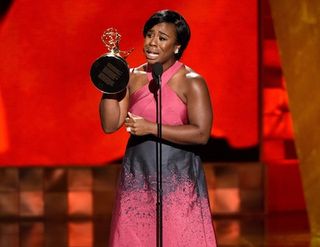Emmys 2015: The Year the Fun Returned and Ratings Didn't

Watching the annual Emmy Awards ritual unfold from inside the Microsoft Theater on Sunday yielded a steady stream of pleasures. The show was smoothly produced, adroitly hosted (sorry, Andy Samberg haters) and consistently entertaining, funny and stirring in nearly equal measure. For once, the Emmys actually felt fun.
Of course, the enjoyment in the room didn't bump the ratings given the preponderance of cable and streaming shows in the winners circle (just four broadcast shows took home trophies in the 26 categories). The telecast plummeted 16% from 2014 levels to the lowest number it has yet recorded. As with all award shows, be they Oscars, Grammys or Tonys, the Emmys can only really scale when they are being contested by mass-audience award shows. At one after-party, a producer and longtime Emmy voter wondered aloud (and he was not alone), "When are they going to shake this up and put it on cable or even let YouTube show the Emmys?"
Answer: Likely never. As enshrined as the Super Bowl as the ultimate pooled asset controlled by broadcast TV, it would take a lot of financial and regulatory gymnastics in order for TV's top honors to be shown to an audience who couldn't pull the signal down for free if they so chose. Such is the conundrum of all linear broadcast TV, and the industry's biggest night is certainly no exception.
If the show is headed to the Elysian fields, Fox's broadcast took it out in blazing style. A disarming number of people thanked their phalanxes of agents/managers/lawyers/nutritionists en masse as opposed to the roll calls of names that make awards shows so tedious. Amy Schumer, whose Comedy Central show won for Outstanding Variety Sketch Series, acknowledged "the suits," jeopardizing the flow of muffin baskets at least momentarily.
Samberg, from his opening video that was a direct hit on the "peak TV" crisis outlined by FX's John Landgraf (whose network also came away empty-handed) to many of his quips along the way ("Racism is over - don't fact-check that"), had the crowd in his corner.
More than bowling anyone over, Samberg did what capable hosts do, which is to provide some finely tuned comedy bits and then get out of the way. When Jon Hamm made a surprisingly emotional, almost sotto voce acceptance speech after finally winning his first Emmy for his final run of episodes as Mad Men's Don Draper, or when Regina King (American Crime), Viola Davis (How to Get Away with Murder) and Uzo Aduba (Orange Is The New Black) all mined deeply inspirational territory in claiming their trophies, the moments resonated because they were allowed to do so. In one novel twist on the usual State of the Union Address-style rote standing ovations, Davis actually brought the crowd to its feet by the end of her speech, with people rising to applaud as she gracefully exited stage left and the telecast cut to commercial.
While the show offered a series of such highlights, the Emmy exercise itself is showing signs of running its course. Their opposite number, now and forever, is the Oscars, which use the festival circuit and an annually refreshed pool of candidates and narratives to stay relevant (New Yorker writer Tad Friend offered one thought via Twitter that was on point, "Turns out the pious self-glorification of the Oscars helps, somehow."). Of course, the Oscar ratings dipped last time out also, in fairness, with Birdman playing the part of Transparent or Veep--a cognoscenti favorite but hardly must-see TV between the coasts..
In place of the sanctimony of the cinema, the Emmys are about volume and repetition. We're not making one movie here, people, taking years to develop and produce something with redeeming cultural value! We're banging out blocks of episodes and cranking out Emmy nominees and winners year after year! The crop got better this time around, and at least voters realized the folly of handing Modern Family a record fifth straight Outstanding Comedy trophy. But there is something inherently familiar, and even wearying, about the chase.
One vignette from the swirl of Emmy weekend pointed up this reality. In front of a Sunset Strip hotel, a prominent Showtime star was at the valet talking on his cellphone. His voice (and beard) were unmistakable. And the voice spoke clearly and decisively at the end of a long awards season.
"This is Mandy Patinkin," he intoned, presumably to a driver or assistant. "I am ready to go."
Broadcasting & Cable Newsletter
The smarter way to stay on top of broadcasting and cable industry. Sign up below
